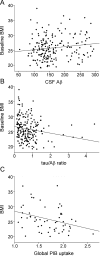Alzheimer disease biomarkers are associated with body mass index
- PMID: 22105948
- PMCID: PMC3233188
- DOI: 10.1212/WNL.0b013e318238eec1
Alzheimer disease biomarkers are associated with body mass index
Abstract
Objective: Both low and high body mass index (BMI) has been associated with cognitive impairment and dementia risk, including Alzheimer disease (AD). We examined the relationship of BMI with potential underlying biological substrates for cognitive impairment.
Methods: We analyzed cross-sectional data from participants enrolled in the Alzheimer's Disease Neuroimaging Initiative (ADNI) with PET imaging using Pittsburgh Compound B (PiB, n = 101) or CSF analyses (n = 405) for β-amyloid peptide (Aβ) and total tau. We assessed the relationship of CSF biomarkers and global PiB uptake with BMI using linear regression controlling for age and sex. We also assessed BMI differences between those who were and were not considered biomarker positive. Finally, we assessed BMI change over 2 years in relationship to AD biomarkers.
Results: No dementia, mild cognitive impairment (MCI), and AD groups were not different in age, education, or BMI. In the overall sample, CSF Aβ (β = 0.181, p < 0.001), tau (β = -0.179, p < 0.001), tau/Aβ ratio (β = -0.180, p < 0.001), and global PiB uptake (β = -0.272, p = 0.005) were associated with BMI, with markers of increased AD burden associated with lower BMI. Fewer overweight individuals had biomarker levels indicative of pathophysiology (p < 0.01). These relationships were strongest in the MCI and no dementia groups.
Conclusions: The presence and burden of in vivo biomarkers of cerebral amyloid and tau are associated with lower BMI in cognitively normal and MCI individuals. This supports previous findings of systemic change in the earliest phases of the disease. Further, MCI in those who are overweight may be more likely to result from heterogeneous pathophysiology.
Figures

References
-
- Gustafson D, Rothenberg E, Blennow K, Steen B, Skoog I. An 18-year follow-up of overweight and risk of Alzheimer disease. Arch Intern Med 2003; 163: 1524– 1528 - PubMed
-
- Rosengren A, Skoog I, Gustafson D, Wilhelmsen L. Body mass index, other cardiovascular risk factors, and hospitalization for dementia. Arch Intern Med 2005; 165: 321– 326 - PubMed
Publication types
MeSH terms
Substances
Grants and funding
- R01 AG022374/AG/NIA NIH HHS/United States
- UL1 RR033173/RR/NCRR NIH HHS/United States
- UL1 RR033179/RR/NCRR NIH HHS/United States
- R01AG033673/AG/NIA NIH HHS/United States
- T32HD057850/HD/NICHD NIH HHS/United States
- P30AG035982/AG/NIA NIH HHS/United States
- UL1 TR001998/TR/NCATS NIH HHS/United States
- R01 AG034614/AG/NIA NIH HHS/United States
- K23NS058252/NS/NINDS NIH HHS/United States
- UL1 TR000117/TR/NCATS NIH HHS/United States
- KL2 RR033177/RR/NCRR NIH HHS/United States
- U01 AG024904/AG/NIA NIH HHS/United States
- U19 AG010483/AG/NIA NIH HHS/United States
- P30 AG035982/AG/NIA NIH HHS/United States
- R01 AG033673/AG/NIA NIH HHS/United States
- T32 HD057850/HD/NICHD NIH HHS/United States
- K23 NS058252/NS/NINDS NIH HHS/United States
- K01 AG035042/AG/NIA NIH HHS/United States
- K01AG035042/AG/NIA NIH HHS/United States
- R01 AG012101/AG/NIA NIH HHS/United States
- P30 AG019610/AG/NIA NIH HHS/United States
- R01AG034614/AG/NIA NIH HHS/United States
LinkOut - more resources
Full Text Sources
Medical
